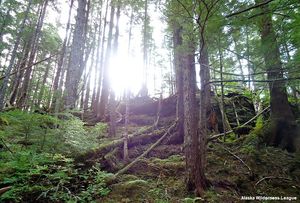Difference between revisions of "Tongass National Forest"
| Line 10: | Line 10: | ||
*'''Most Recent Development:''' Roadless Rule Exemption Review Process. As of September 2018, the U.S. Forest Service is evaluating a state-specific Roadless Rule as requested by the state of Alaska. | *'''Most Recent Development:''' Roadless Rule Exemption Review Process. As of September 2018, the U.S. Forest Service is evaluating a state-specific Roadless Rule as requested by the state of Alaska. | ||
*'''Threats:''' A Roadless Rule rollback and/or exemption for the Tongass could re-start wide scale clearcutting of old-growth logging. Additionally, land transfers to private corporations could fragment the forest even further. | *'''Threats:''' A Roadless Rule rollback and/or exemption for the Tongass could re-start wide scale clearcutting of old-growth logging. Additionally, land transfers to private corporations could fragment the forest even further. | ||
| − | '''Climate Change:''' The Tongass alone absorbs approximately 8% of the nation’s annual global warming pollution. No other national forest even comes close, making the Tongass the nation’s premier climate insurance policy. Additionally, when old-growth rainforests like the Tongass are cut down, they release up to two-thirds of their stored carbon to the atmosphere. | + | *'''Climate Change:''' The Tongass alone absorbs approximately 8% of the nation’s annual global warming pollution. No other national forest even comes close, making the Tongass the nation’s premier climate insurance policy. Additionally, when old-growth rainforests like the Tongass are cut down, they release up to two-thirds of their stored carbon to the atmosphere. |
| − | '''Wildlife:''' Five species of Pacific Salmon, humpback and orca whales, otters, beavers, wolves, deer, plus some of the largest concentrations of brown bears and bald eagles in America. | + | *'''Wildlife:''' Five species of Pacific Salmon, humpback and orca whales, otters, beavers, wolves, deer, plus some of the largest concentrations of brown bears and bald eagles in America. |
|- | |- | ||
Revision as of 06:46, 3 October 2018
| KEY FACTS |
|
At approximately 17 million acres, the Tongass National Forest is America’s largest national forest, encompassing the majority of the southeast Alaska panhandle. Each year more than 1 million people come to experience glaciers flowing from the mountains into the sea and iconic wildlife that thrives in one of the largest remaining temperate rainforests in the world.
Alaska’s national forests were covered under the Roadless Rule expressly because forest wildlands persist in Alaska on a scale unknown elsewhere in the country. In addition to harboring great natural beauty and iconic wildlife, scientists believe that retaining the intact roadless areas of the Tongass is a “key element” in sustaining the region’s extraordinary salmon runs (and its commercial, subsistence and recreational fisheries). Unfortunately, through legislation and regulatory rollbacks, the Alaska delegation and the current administration are attempting to exempt the Tongass from roadless protections.
At the end of the Obama administration, the U.S. Forest Service finalized an amendment to the Tongass Land Management Plan (TLMP) that slowly moves the Tongass away from taxpayer-subsidized, industrial-scale old-growth logging, long since abandoned elsewhere in the national forest system. Despite strong public support and scientific backing, the Alaska delegation, similar to its actions on the Roadless Rule, has been attempting to reverse and weaken protections guaranteed by TLMP through riders in must-pass legislative vehicles and stand-alone legislation. Please see below for relevant legislation, talking points, fact sheets and more on what we're doing to defend the Tongass National Forest.
Fact Sheets | Public Letters | Maps | Research & Reports
Recent Legislative Activity
- S. 3333, Roadless Area Conservation Act of 2018
- This bill would provide lasting protection for inventoried roadless areas within the National Forest System.
- To cosponsor, email Bryan Petit (mailto:Bryan_Petit@energy.senate.gov) on Senator Maria Cantwell's (D-WA) Energy and Natural Resources Committee staff.
- H.R. 2, 2018 Farm Bill
- H.Amdt598 from Representative Don Young (R-AK-1) would exempt all national forests in Alaska from the Roadless Rule.
- S. 1481, Alaska Native Claims Settlement Improvement Act
- From Senator Lisa Murkowski (R-AK), this bill contains numerous provisions that would circumvent the 1971 Alaska Native Claims Settlement Act (ANCSA) by removing important checks and balances, especially with regard to some of Alaska’s most high quality public lands within the Tongass National Forest and the National Wildlife Refuge System.
- S. 785, Alaska Native Veterans Land Allotment Equity Act
- From Rep. Don Young / Senator Dan Sullivan (R-AK), this bill would allow the transfer of nearly half a million acres of public land into private ownership, carving up Alaska’s most valuable public lands and creating thousands of inholdings in national wildlife refuges and other important areas.
Talking Points
- Opening up the Tongass National Forest roadless areas to road building and logging would threaten the abundant wildlife and beautiful scenery essential to the tourism fishing industries in Southeast Alaska, each of which contributes approximately $1 billion dollars to the region’s economy each year.
- The Roadless Rule is the result of one of the most extensive public processes in U.S. history – more than 1.6 million people submitted comments on the rule, and 95% of those commented favorably on roadless protections.
- Southeast Alaska can move forward with the TLMP Amendment. Built on the consensus of Alaskans, the amendment supports prioritizing premiere salmon watersheds and other essential conservation lands, and shifting priorities to meet the needs of all Southeast Alaskans, not just the timber industry.
Fact Sheets
Public Letters
- Letter from Scientists to the USFS Supporting Roadless Rule Protection in the Tongass, September 2018
- Environmental Community Opposition Letter to Alaska Native Claims Settlement Improvement Act (S. 1481), January 2018
- Letter from Business Owners, Guides, Outfitters, Hunters and Anglers Supporting Tongass 77
